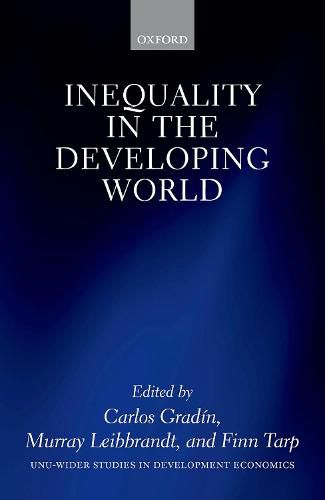Readings Newsletter
Become a Readings Member to make your shopping experience even easier.
Sign in or sign up for free!
You’re not far away from qualifying for FREE standard shipping within Australia
You’ve qualified for FREE standard shipping within Australia
The cart is loading…






This is an open access title available under the terms of a CC BY-NC-SA 3.0 IGO licence. It is free to read at Oxford Scholarship Online and offered as a free PDF download from OUP and selected open access locations. Inequality has emerged as a key development challenge. It holds implications for economic growth and redistribution and translates into power asymmetries that can endanger human rights, create conflict, and embed social exclusion and chronic poverty. For these reasons, it underpins intense public and academic debates and has become a dominant policy concern within many countries and in all multilateral agencies. It is at the core of the 17 goals of the UN 2030 Agenda for Sustainable Development. This book contributes to this important discussion by presenting assessments of the measurement and analysis of global inequality by leading inequality scholars, aligning these to comprehensive reviews of inequality trends in five of the world's largest developing countries--Brazil, China, India, Mexico, and South Africa. Each is a persistently high or newly high inequality context and, with the changing global inequality situation as context, country chapters investigate the main factors shaping their different inequality dynamics. Particular attention is paid to how broader societal inequalities arising outside of the labour market have intersected with the rapidly changing labour market milieus of the last few decades. Collectively, these chapters provide a nuanced discussion of key distributive phenomena such as the high concentration of income among the most affluent people, gender inequalities, and social mobility. Substantive tax and social benefit policies that each country implemented to mitigate these inequality dynamics are assessed in detail. The book takes lessons from these contexts back into the global analysis of inequality and social mobility and the policies needed to address inequality.
$9.00 standard shipping within Australia
FREE standard shipping within Australia for orders over $100.00
Express & International shipping calculated at checkout
This is an open access title available under the terms of a CC BY-NC-SA 3.0 IGO licence. It is free to read at Oxford Scholarship Online and offered as a free PDF download from OUP and selected open access locations. Inequality has emerged as a key development challenge. It holds implications for economic growth and redistribution and translates into power asymmetries that can endanger human rights, create conflict, and embed social exclusion and chronic poverty. For these reasons, it underpins intense public and academic debates and has become a dominant policy concern within many countries and in all multilateral agencies. It is at the core of the 17 goals of the UN 2030 Agenda for Sustainable Development. This book contributes to this important discussion by presenting assessments of the measurement and analysis of global inequality by leading inequality scholars, aligning these to comprehensive reviews of inequality trends in five of the world's largest developing countries--Brazil, China, India, Mexico, and South Africa. Each is a persistently high or newly high inequality context and, with the changing global inequality situation as context, country chapters investigate the main factors shaping their different inequality dynamics. Particular attention is paid to how broader societal inequalities arising outside of the labour market have intersected with the rapidly changing labour market milieus of the last few decades. Collectively, these chapters provide a nuanced discussion of key distributive phenomena such as the high concentration of income among the most affluent people, gender inequalities, and social mobility. Substantive tax and social benefit policies that each country implemented to mitigate these inequality dynamics are assessed in detail. The book takes lessons from these contexts back into the global analysis of inequality and social mobility and the policies needed to address inequality.